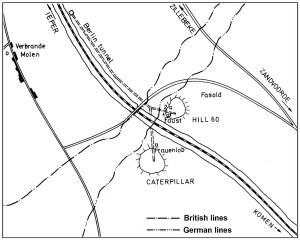7th June 1917 Thursday
All material produced or reproduced here and throughout this work is the sole copyright of the author and the family of Doctor D.C.M. Page MC.
Today began the assault on Messines, widely regarded as a military success for the British and their allies, but at the same time some observers felt that its strategic value wasn’t that significant. The German viewpoint seems to confirm that it was a defeat for them, Ludendorff and Hindenburg later wrote of their regrets over Messines. It was a week long battle that did result in some gains and at the time served to improve morale at a much needed moment. It was also to be the precursor of the next “Big Push” by Haig in the next important stage of the war which was to be known as the “Third Battle of Ypres” or by its simpler name “Passchendaele”.
Hill 60 was in fact a pair of hills known before the war as Cote de Amants or Lovers Knoll, the northern of the two was known as Hill 60 and the southern the Caterpillar. British engineers had been tunnelling below Hill 60 for almost two years and had packed the tunnels with many tonnes of high explosives. On this day those explosives were detonated and thousands of German soldiers were blown to bits along with a large chunk of Hill 60.
“At 4 a.m. on 7th June there was a terrific bombardment and later we heard that we had captured Messines and Hill 60 with 9,000 prisoners. All the casualty clearing stations at Poperinghe and Proven were very busy. We were kept busy too attending to wounded and gassed men.”

Image by ViennaUK via Creative Commons https://en.wikipedia.org/wiki/Hill_60_(Ypres)#/media/File:Battle_of_Messines_1917_mine_plan_-_Hill_60.jpg
Find out about our connection with Dr Page and an introduction to his diary here